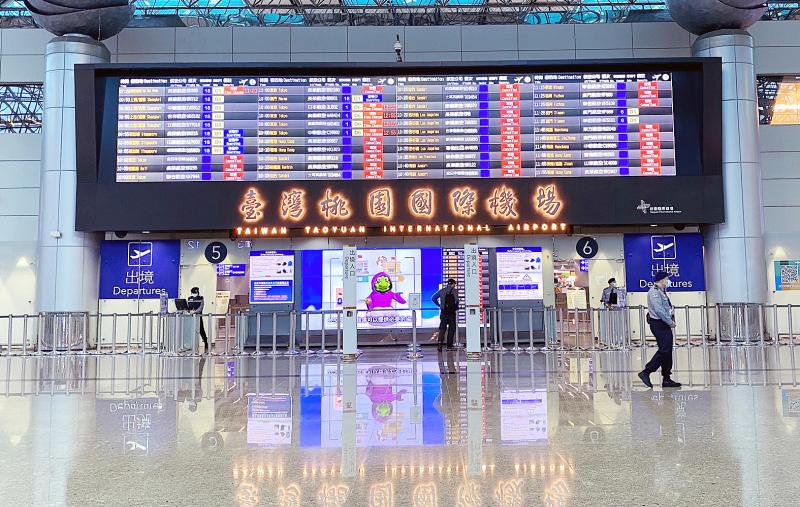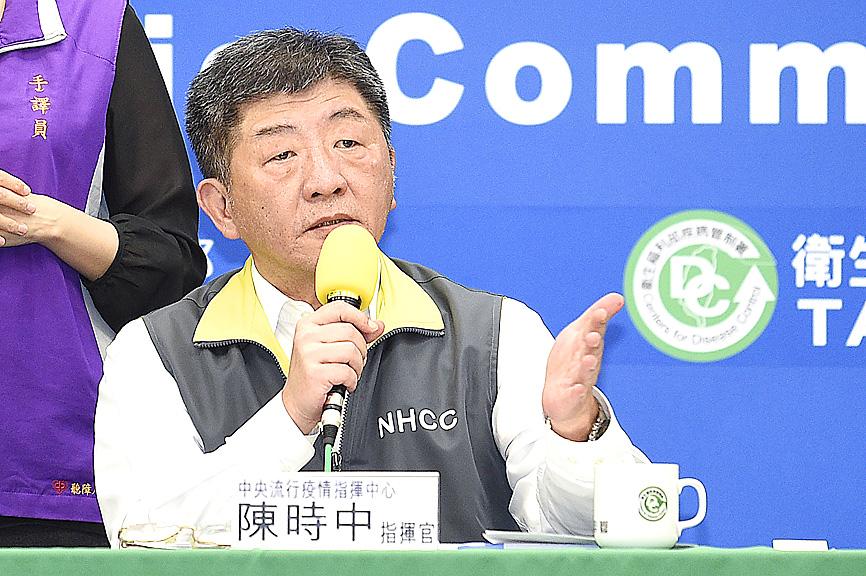The Central Epidemic Command Center (CECC) yesterday announced 18 imported cases of COVID-19, bringing Taiwan’s total number of confirmed cases to 153.
Minister of Health and Welfare Chen Shih-chung (陳時中), who heads the center, said that the 18 new cases were comprised of 12 women and six men.
Most of the patients are aged between 20 and 40, he said, adding that three are in their 50s and one man is in his 70s.

Photo: CNA
Six of them exhibited symptoms on arrival in Taiwan and were tested for the virus, three were under home quarantine, two were in home isolation and one was conducting self-health management, Chen said, adding that they were detected while in more protected situations.
The remaining six cases were detected after they sought medical treatment on their own, he said.
People who returned from the US or East Asian countries between March 8 and Wednesday and sought medical attention for respiratory symptoms would be ordered into 14-day home quarantine and tested for the novel coronavirus, the center said.

Photo: Chen Chih-chu, Taipei Times
“In the past few days we have tracked people who returned from Europe or the Middle East between March 5 and March 14, and issued them home quarantine orders,” Chen said. “Testing has been arranged for those we consider to be at higher risk.”
“We are now tracking people who arrived in Taiwan from the US or East Asian countries between March 8 and Wednesday, and have sought medical attention for respiratory symptoms,” he said. “They will be asked to undergo 14-day home quarantine and testing would be arranged.
There are about 3,000 people who meet the new criteria, Chen said, adding that the center was yesterday afternoon to begin encouraging them to proactively call the 1922 toll-free hotline. It was sending text messages to those with registered mobile phone numbers and having local health bureaus try to contact them to issue quarantine notices and arrange for testing.
Following the implementation of an entry ban on all foreign nationals and home quarantine orders for all arriving travelers, Deputy Minister of the Interior Chen Tsung-yen (陳宗彥) said that about 1,800 people entered Taiwan as of 12pm yesterday, and there were about 5,000 arrivals on Friday.
“We urge everyone to avoid unnecessary travel,” he said.
As the number of travelers returning and leaving Taiwan have gradually fallen over the past few days, the goal of curbing the flow of people can hopefully be achieved, he added.
As the number of people placed in mandatory home quarantine has rapidly increased due to the tightened border controls, Chen Shih-chung urged them to maintain separation of at least 1m — preferably more than 2m — from people with whom they live.
People should avoid sharing household items, such as tableware, towels and bedding, with people in home quarantine and disinfect their homes regularly, he said, adding that they should also avoid sharing meals and intimate contact.
Asked why Taiwan has not implemented mass testing for the coronavirus like South Korea, Chen Shih-chung said that an average of 1,300 people are tested daily in Taiwan and that the strategy is to screen those at high risk of infection.
If mass testing is conducted, some asymptomatic carriers could have a false negative result due to a low viral load, which could cause them to believe they are safe and forgo precautionary measures, leading to a higher risk of infecting others, he said, adding that the capacity to conduct mass triage and mass isolation are needed for mass screening.
The Diamond Princess cruise ship demonstrated that an inability to completely separate infected people from others led to more infections, he added.
“While we have chosen to test people we consider to be at higher risk, we must also ensure that people get tested immediately after the onset of symptoms,” Chen Shih-chung said.
As the criteria for reporting suspected cases for testing are not clear-cut, it is important that hospitals test suspected patients, who must remain at home while they await results, he said.
Only seven locally transmitted cases have been reported in the past two weeks, four of whom were infected by people who returned from overseas trips, so people do not need to be overly concerned about community spread, he added.
However, as these two weeks are a critical phase in fighting the spread of COVID-19, people who are in home quarantine should strictly conform to the regulations, Chen Shih-chung said.

NATIONAL SECURITY THREAT: An official said that Guan Guan’s comments had gone beyond the threshold of free speech, as she advocated for the destruction of the ROC China-born media influencer Guan Guan’s (關關) residency permit has been revoked for repeatedly posting pro-China content that threatens national security, the National Immigration Agency said yesterday. Guan Guan has said many controversial things in her videos posted to Douyin (抖音), including “the red flag will soon be painted all over Taiwan” and “Taiwan is an inseparable part of China,” while expressing hope for expedited “reunification.” The agency received multiple reports alleging that Guan Guan had advocated for armed reunification last year. After investigating, the agency last month issued a notice requiring her to appear and account for her actions. Guan Guan appeared as required,

A strong cold air mass is expected to arrive tonight, bringing a change in weather and a drop in temperature, the Central Weather Administration (CWA) said. The coldest time would be early on Thursday morning, with temperatures in some areas dipping as low as 8°C, it said. Daytime highs yesterday were 22°C to 24°C in northern and eastern Taiwan, and about 25°C to 28°C in the central and southern regions, it said. However, nighttime lows would dip to about 15°C to 16°C in central and northern Taiwan as well as the northeast, and 17°C to 19°C elsewhere, it said. Tropical Storm Nokaen, currently

‘NATO-PLUS’: ‘Our strategic partners in the Indo-Pacific are facing increasing aggression by the Chinese Communist Party,’ US Representative Rob Wittman said The US House of Representatives on Monday released its version of the Consolidated Appropriations Act, which includes US$1.15 billion to support security cooperation with Taiwan. The omnibus act, covering US$1.2 trillion of spending, allocates US$1 billion for the Taiwan Security Cooperation Initiative, as well as US$150 million for the replacement of defense articles and reimbursement of defense services provided to Taiwan. The fund allocations were based on the US National Defense Authorization Act for fiscal 2026 that was passed by the US Congress last month and authorized up to US$1 billion to the US Defense Security Cooperation Agency in support of the

PAPERS, PLEASE: The gang exploited the high value of the passports, selling them at inflated prices to Chinese buyers, who would treat them as ‘invisibility cloaks’ The Yilan District Court has handed four members of a syndicate prison terms ranging from one year and two months to two years and two months for their involvement in a scheme to purchase Taiwanese passports and resell them abroad at a massive markup. A Chinese human smuggling syndicate purchased Taiwanese passports through local criminal networks, exploiting the passports’ visa-free travel privileges to turn a profit of more than 20 times the original price, the court said. Such criminal organizations enable people to impersonate Taiwanese when entering and exiting Taiwan and other countries, undermining social order and the credibility of the nation’s